Course Highlights and Why Data Science Course in Chennai at FITA Academy?
Upcoming Batches
- 28-02-2026
- Weekend
- Saturday (Saturday - Sunday)
- 02-03-2026
- Weekdays
- Monday (Monday - Friday)
- 05-03-2026
- Weekdays
- Thursday (Monday - Friday)
- 07-03-2026
- Weekend
- Saturday (Saturday - Sunday)
Classroom Training
- Get trained by Industry Experts via Classroom Training at any of the FITA Academy branches near you
- Why Wait? Jump Start your Career by taking Data Science Course in Chennai!
Instructor-Led Live Online Training
- Take-up Instructor-led Live Online Training. Get the Recorded Videos of each session.
- Travelling is a Constraint? Jump Start your Career by taking the Data Science Training Online!
Data Science Course Objectives
- Learn the basics of data science by introducing key concepts, such as the data science life cycle.
- Students are introduced to Python or R programming, their versions, and an in-depth study of the programming languages.
- Read through fundamental statistics and the application of statistical analysis, and distinguish between inferential and descriptive statistics.
- Data science models and algorithms include predictive models, predictive analyses, linear regression, and polynomial regression.
- Being trained with supervised and unsupervised learning algorithms, hypothesis testing, and reinforcement learning algorithms.
Data Science Course Syllabus
Introduction to Data Science
- Understanding Data Science
- The Data Science Life Cycle
- Understanding Artificial Intelligence (AI)
- Overview of Implementation of Artificial Intelligence
- Machine Learning
- Deep Learning
- Artificial Neural Networks (ANN)
- Natural Language Processing (NLP)
- How R connected to Machine Learning
- R - as a tool for Machine Learning Implementation
Data Science with Python: Introduction to Python
- What is Python and history of Python
- Python-2 and Python-3 differences
- Install Python and Environment Setup
- Python Identifiers, Keywords and Indentation
- Comments and document interlude in Python
- Command line arguments and Getting User Input
- Python Basic Data Types and Variables
List, Ranges & Tuples in Python
- Understanding Lists in Python
- Understanding Iterators
- Generators, Comprehensions and Lambda Expressions
- Understanding and using Ranges
Python Dictionaries and Sets
- Introduction to the section
- Python Dictionaries and More on Dictionaries
- Sets and Python Sets Examples
Input and Output in Python
- Reading and writing text files
- Appending to Files
- Writing Binary Files Manually and using Pickle Module
Python functions
- Python user defined functions
- Python packages functions
- The anonymous Functions
- Loops and statement in Python
- Python Modules & Packages
Python Exceptions Handling
- What is Exception?
- Handling an exception
- try….except…else
- try-finally clause
- Argument of an Exception
- Python Standard Exceptions
- Raising an exceptions
- User-Defined Exceptions
Python Regular Expressions
- What are regular expressions?
- The match Function and the Search Function
- Matching vs Searching
- Search and Replace
- Extended Regular Expressions and Wildcard
Useful additions
- Collections – named tuples, default dicts
- Debugging and breakpoints, Using IDEs
Data Manipulation using Python
- Understanding different types of Data
- Understanding Data Extraction
- Managing Raw and Processed Data
- Wrangling Data using Python
- Using Mean, Median and Mode
- Variation and Standard Deviation
- Probability Density and Mass Functions
- Understanding Conditional Probability
- Exploratory Data Analysis (EDA)
- Working with Numpy, Scipy and Pandas
Understanding Machine Learning Models
- Understand what is a Machine Learning Model
- Various Machine Learning Models
- Choosing the Right Model
- Training and Evaluating the Model
- Improving the Performance of the Model
More on Models
- Understanding Predictive Model
- Working with Linear Regression
- Working with Polynomial Regression
- Understanding Multi Level Models
- Selecting the Right Model or Model Selection
- Need for selecting the Right Model
- Understanding Algorithm Boosting
- Various Types of Algorithm Boosting
- Understanding Adaptive Boosting
Understanding Machine Learning Algorithms
- Understanding the Machine Learning Algorithms
- Importance of Algorithms in Machine Learning
- Exploring different types of Machine Learning Algorithms
- Supervised Learning
- Unsupervised Learning
- Reinforcement Learning
Exploring Supervised Learning Algorithms
- Understanding the Supervised Learning Algorithm
- Understanding Classifications
- Working with different types of Classifications
- Learning and Implementing Classifications
- Logistic Regression
- Naïve Bayes Classifier
- Nearest Neighbour
- Support Vector Machines (SVM)
- Decision Trees
- Boosted Trees
- Random Forest
- Time Series Analysis (TSA)
- Understanding Time Series Analysis
- Advantages of using TSA
- Understanding various components of TSA
- AR and MA Models
- Understanding Stationarity
- Implementing Forecasting using TSA
Exploring Un-Supervised Learning Algorithms
- Understanding Unsupervised Learning
- Understanding Clustering and its uses
- Exploring K-means
- What is K-means Clustering
- How K-means Clustering Algorithm Works
- Implementing K-means Clustering
- Exploring Hierarchical Clustering
- Understanding Hierarchical Clustering
- Implementing Hierarchical Clustering
- Understanding Dimensionality Reduction
- Importance of Dimensions
- Purpose and advantages of Dimensionality Reduction
- Understanding Principal Component Analysis (PCA)
- Understanding Linear Discriminant Analysis (LDA)
Understanding Hypothesis Testing
- What is Hypothesis Testing in Machine Learning
- Advantages of using Hypothesis Testing
- Basics of Hypothesis
- Normalization
- Standard Normalization
- Parameters of Hypothesis Testing
- Null Hypothesis
- Alternative Hypothesis
- The P-Value
- Types of Tests
- T Test
- Z Test
- ANOVA Test
- Chi-Square Test
Overview Reinforcement Learning Algorithm
- Understanding Reinforcement Learning Algorithm
- Advantages of Reinforcement Learning Algorithm
- Components of Reinforcement Learning Algorithm
- Exploration Vs Exploitation tradeoff
Data Science with R: Introduction to R Programming
- What is R?
- History and Features of R
- Introduction to R Studio
- Installing R and Environment Setup
- Command Prompt
- Understanding R programming Syntax
- Understanding R Script Files
R Programming Basics
- Data types in R
- Creating and Managing Variables
- Understanding Operators
- Assignment Operators
- Arithmetic Operators
- Relational and Logical Operators
- Other Operators
- Understanding and using Decision Making Statements
- The IF Statement
- The IF…ELSE statement
- Switch Statement
- Understanding Loops and Loop Control
- Repeat Loop
- While Loop
- For Loop
- Controlling Loops with Break and Next Statements
More on Data Types
- Understanding the Vector Data type
- Introduction to Vector Data type
- Types of Vectors
- Creating Vectors and Vectors with Multiple Elements
- Accessing Vector Elements
- Understanding Arrays in R
- Introduction to Arrays in R
- Creating Arrays
- Naming the Array Rows and Columns
- Accessing and manipulating Array Elements
- Understanding the Matrices in R
- Introduction to Matrices in R
- Creating Matrices
- Accessing Elements of Matrices
- Performing various computations using Matrices
- Understanding the List in R
- Understanding and Creating List
- Naming the Elements of a List
- Accessing the List Elements
- Merging different Lists
- Manipulating the List Elements
- Converting Lists to Vectors
- Understanding and Working with Factors
- Creating Factors
- Data frame and Factors
- Generating Factor Levels
- Changing the Order of Levels
- Understanding Data Frames
- Creating Data Frames
- Matrix Vs Data Frames
- Sub setting data from a Data Frame
- Manipulating Data from a Data Frame
- Joining Columns and Rows in a Data Frame
- Merging Data Frames
- Converting Data Types using Various Functions
- Checking the Data Type using Various Functions
Functions in R
- Understanding Functions in R
- Definition of a Function and its Components
- Understanding Built in Functions
- Character/String Functions
- Numerical and Statistical Functions
- Date and Time Functions
- Understanding User Defined Functions (UDF)
- Creating a User Defined Function
- Calling a Function
- Understanding Lazy Evaluation of Functions
Working with External Data
- Understanding External Data
- Understanding R Data Interfaces
- Working with Text Files
- Working with CSV Files
- Understanding Verify and Load for Excel Files
- Using WriteBin() and ReadBin() to manipulate Binary Files
- Understanding the RMySQL Package to Connect and Manage MySQL Databases
Data Visualization with R
- What is Data Visualization
- Understanding R Libraries for Charts and Graphs
- Using Charts and Graphs for Data Visualizations
- Exploring Various Chart and Graph Types
- Pie Charts and Bar Charts
- Box Plots and Scatter Plots
- Histograms and Line Graphs
Exploring Statistical Computations using R
- Understanding the Basics of Statistical Analysis
- Uses and Advantages of Statistical Analysis
- Understanding and using Mean, Median and Mode
- Understanding and using Linear, Multiple and Logical Regressions
- Generating Normal and Binomial Distributions
- Understanding Inferential Statistics
- Understanding Descriptive Statistics and Measure of Central Tendency
Packages in R
- Understanding Packages
- Installing and Loading Packages
- Managing Packages
Understanding Machine Learning Models
- Understand what is a Machine Learning Model
- Various Machine Learning Models
- Choosing the Right Model
- Training and Evaluating the Model
- Improving the Performance of the Model
More on Models
- Understanding Predictive Model
- Working with Linear Regression
- Working with Polynomial Regression
- Understanding Multi Level Models
- Selecting the Right Model or Model Selection
- Need for selecting the Right Model
- Understanding Algorithm Boosting
- Various Types of Algorithm Boosting
- Understanding Adaptive Boosting
Understanding Machine Learning Algorithms
- Understanding the Machine Learning Algorithms
- Importance of Algorithms in Machine Learning
- Exploring different types of Machine Learning Algorithms
- Supervised Learning
- Unsupervised Learning
- Reinforcement Learning
Exploring Supervised Learning Algorithms
- Understanding the Supervised Learning Algorithm
- Understanding Classifications
- Working with different types of Classifications
- Learning and Implementing Classifications
- Logistic Regression
- Naïve Bayes Classifier
- Nearest Neighbor
- Support Vector Machines (SVM)
- Decision Trees
- Boosted Trees
- Random Forest
- Time Series Analysis (TSA)
- Understanding Time Series Analysis
- Advantages of using TSA
- Understanding various components of TSA
- AR and MA Models
- Understanding Stationarity
- Implementing Forecasting using TSA
Exploring Un-Supervised Learning Algorithms
- Understanding Unsupervised Learning
- Understanding Clustering and its uses
- Exploring K-means
- What is K-means Clustering
- How K-means Clustering Algorithm Works
- Implementing K-means Clustering
- Exploring Hierarchical Clustering
- Understanding Hierarchical Clustering
- Implementing Hierarchical Clustering
- Understanding Dimensionality Reduction
- Importance of Dimensions
- Purpose and advantages of Dimensionality Reduction
- Understanding Principal Component Analysis (PCA)
- Understanding Linear Discriminant Analysis (LDA)
Understanding Hypothesis Testing
- What is Hypothesis Testing in Machine Learning
- Advantages of using Hypothesis Testing
- Basics of Hypothesis
- Normalization
- Standard Normalization
- Parameters of Hypothesis Testing
- Null Hypothesis
- Alternative Hypothesis
- The P-Value
- Types of Tests
- T Test
- Z Test
- ANOVA Test
- Chi-Square Test
Overview Reinforcement Learning Algorithm
- Understanding Reinforcement Learning Algorithm
- Advantages of Reinforcement Learning Algorithm
- Components of Reinforcement Learning Algorithm
- Exploration Vs Exploitation tradeoff
Data Science Course Trainer Profile
- Our trainers have extensive experience in various data science domains, including data analysis, Data analytics, and Data Engineering.
- Our trainers are certified professionals with years of experience training numerous batches.
- They impart industry-relevant skills to students and expose them to real-world projects.
- Their expertise ensures effective learning and is a valuable asset in guiding students through complex concepts and practical applications.
- They stay up to date with the latest technologies in their industry.
- They implement innovative teaching approaches, including a comprehensive Data Science tutorial that reinforces key concepts, improves retention, and facilitates a deeper understanding and long-term success.
- Through FITA Academy’s Data Science Course in Chennai, trainers guide students through the necessary interview tips.
Learn at FITA Academy & Get Your
Dream IT Job in 60 Days
like these Successful Students!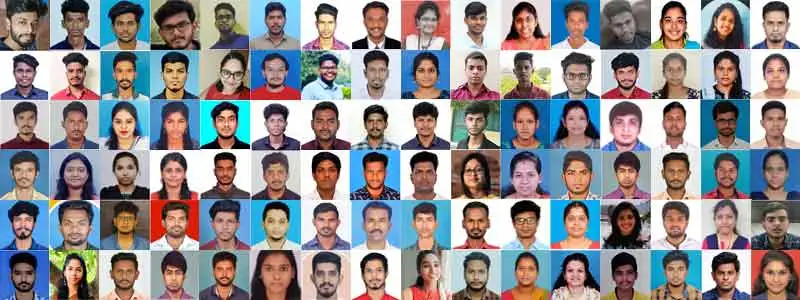
Student Success Story of Data Science Course in Chennai
Anitha is the mother of a two-year-old girl. She graduated five years ago and worked for a year before quitting her job after getting married. She was thinking of resuming her career after her financial responsibilities increased following the birth of her child. Her job search efforts were futile due to her long career break and lack of skill set updates. That’s when she approached FITA Academy after being referred by one of her cousins.
She wanted to choose the best data science courses in Chennai, leveraging her experience with spreadsheets and databases. To balance her family commitments, especially caring for her child, she opted for our online course. Managing both family and education was challenging, but she found our online course accommodating.
Despite these burdens, she excelled in her studies, attending sessions regularly and completing the capstone projects with outstanding performance. Her dedication and stability showcased her passion for learning and her drive to achieve her career goals. This journey is an inspiring example of overcoming obstacles to pursue personal and professional growth.
With our placement cell, she obtained training for placements and interviews. With her updated knowledge, she aced the interviews quickly this time around. She was placed in three companies: Team Everest, Accenture, and Foyer Technologies. She opted for Accenture, where she received an offer as a data engineer at a salary of 6 LPA. FITA Academy helped Anita to start her second innings of her career as a model.
Key Features
FITA Academy empowers individuals with industry-relevant skills through expert-led training, transforming careers with hands-on experience.

Expert Trainers
Learn from industry professionals with hands-on experience.

Real-Time Projects
Gain practical exposure by working on live projects.

Certification
Get certified from FITA Academy and become job-ready.

Affordable Fees
High-quality courses available at a low budget.

Flexible Learning
Choose online/classroom, timings, and learning pace.

Placement Support
Access 3000+ companies for career opportunities.
Why Learn Data Science Course in Chennai at FITA Academy?
Live Capstone Projects
Real time Industry Experts as Trainers
Placement Support till you get your Dream Job offer!
Free Interview Clearing Workshops
Free Resume Preparation & Aptitude Workshops
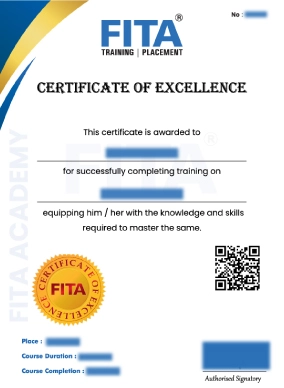
Data Science Certification Training in Chennai
The Data Science Course in Chennai provided by FITA Academy encourages a deep understanding of the subject, with hands-on practice in essential tools and algorithms employed by data scientists. On completion of the Data Scientist Course in Chennai, you’ll earn a course completion certificate to enhance your credibility for high-level roles in MNCs. This certificate shows that you know how to use the concepts to find real-world problem solutions.
The training also places a strong emphasis on assertiveness, which has the potential to make the trainers stand out during interviews and hence gain offers. Over the years, our program has equipped learners with a real-world perspective on the fundamental areas of data science, enabling them to remain relevant in this burgeoning industry. The Data Science Certification in Chennai gives people the necessary skills and employment opportunities they need to pursue a career as data scientists.
Polishing one’s personality and obtaining a certification before the start of the job hunt can allow students to find promising professions more easily. Helpful, professional competencies are highlighted in the course and are perfect soft skills for students to gain an advantage in the labor market. Data Science Training Institute in Chennai is an excellent way to achieve a successful career by helping students learn the necessary data science methods and approaches.
The data scientist course Chennai combines data analysis, application of machine learning, predictive modeling, and problem-solving. Combining theoretical and practical aspects of professional growth, this certification helps students succeed in their fields. Whether entering the field or advancing their careers, students gain self-assurance and skills necessary to succeed in the rapidly growing data science domain.
FITA Academy’s Data Science Course in Chennai is internationally recognized, and there exist several other certifications that are primarily focused on aiding students further, such as
- Google Professional Data Engineer Certification
- Microsoft Certified Azure Data Scientist Associate Certification
- Dell EMC Data Science Certification
- IBM Data Science Professional Certification
- SAS Certified Data Scientist
Advantages of taking the Data Science Course in Chennai at FITA Academy
Students who attend the Data Science Course in Chennai at FITA Academy gain numerous advantages that help enhance their success in the evolving data science industry. Here’s what makes FITA Academy unique:
Personalized Attention
At FITA Academy, each student gets individualised attention to fulfill their placement needs. The instructors provide individualised assistance, addressing questions and helping students grasp complex concepts. This customised method helps students quickly grasp challenging subjects and prepare for success.
Comprehensive Training
From fundamental statistics to advanced machine learning techniques, FITA Academy’s data science training in Chennai covers a wide range of topics. This type of curriculum aims to develop students with the basic skills of practical data analysis, preparing them for the industry’s needs.
Hands-On Experience
Our hands-on learning enables students to engage in real projects and case studies. This practical experience is crucial for solidifying theoretical understanding and enabling students to apply their knowledge in real-life situations. It also boosts confidence when entering the job market.
Industry-Relevant Tools and Techniques
We cover training on industry-standard tools such as Python, R, SQL, and Tableau, which are commonly found within data science initiatives. Students will be able to gain an edge in the job market and enhance their employment opportunities by mastering these tools.
Support for Job Placement
FITA Academy offers 100% placement support, helping students prepare for job interviews and connect with top employers. This guidance helps students secure rewarding roles in leading companies.
Industry-Recognized Certification
After completing the Data Science Course in Chennai, students get a certification recognised by the most trustworthy companies in the data science industry. This certification offers you opportunities that enhance your career and provide a competitive advantage if you aspire to work in the field of data science.
Have Queries?
Talk to our Career Counselor for more Guidance on picking the right Career for you!
Placement Session & Job Opportunities
After completing Data Science Course in Chennai
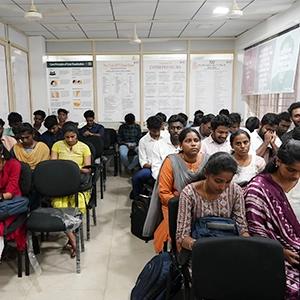



The expertise of data scientists is essential for managing the vast datasets flowing from social media and e-commerce platforms. Most companies recognize data scientists as crucial for adopting Artificial Intelligence. This growing demand, coupled with the need for specific technical skills and toolsets, is projected to result in a 30% increase in Data Science job openings.
Recognizing the critical industry need, FITA Academy provides comprehensive training and placement support through its Data Science Course in Chennai. Our Corporate Training in Chennai equips students with the in-demand technical skills and toolsets vital for businesses.
The data scientist salary for freshers in India generally ranges from ₹5 Lakhs to ₹8 Lakhs per annum. With 4–5 years of experience, a skilled professional can easily command over ₹15 Lakhs annually. In major hubs like Chennai, top MNCs such as Accenture and TCS offer competitive packages to FITA Academy graduates.
The Data Science Course in Chennai, offered here at FITA Academy, provides knowledge and practical experience to face the competition in this field with competitive salaries. We encourage students to undertake practical projects and, with the guidance of like-minded professionals, succeed in the data science profession they aspire to.
“Students are offered 100% placement training & assistance at the end of the course.”
Our 100% placement assistance program is designed around the concept of “Predictive Career Mapping.” Instead of simply sharing job leads, we analyze your strengths during the capstone projects to match you with specialized roles in high-growth sectors. We provide personalized mentorship from senior data architects who help you optimize your GitHub portfolio and refine your technical storytelling. This high-value professional guidance, combined with our network of over 3,000 hiring partners, ensures that our graduates enter the industry with a competitive advantage. This results in our students securing premium roles at leading MNCs such as Accenture and TCS, often with salary packages 40% above the industry baseline for freshers. We offer the best training support at a highly reasonable fee, ensuring that professional excellence is accessible to every dedicated learner.
What are the job opportunities for course completion?
A data science course in Chennai will open the doors to a stable career for individuals with analytical skills and a passion for deriving insights from data. Roles such as data analyst, machine learning engineer, data scientist, and business analyst involve data-driven decision-making and are in high demand within the industry. Foundational skills for analyzing and interpreting complex datasets are taught to professionals trained in key programming languages such as R, Python, and SQL.
Trainers at FITA Academy emphasize theoretical knowledge and practical skills, enabling students to learn effectively and be well-prepared for real-world challenges. The curriculum combines current tools and methods to test learners’ hands-on experience solving industry-related problems. It is essential to strike a balance between theory and practice to become an expert in the techniques of data visualisation, statistical modelling, and machine learning algorithms.
The demand for experienced professionals grows as organizations recognize the value of extracting actionable insights from data. Students can succeed in their chosen industries and contribute significantly to their organisations by mastering these qualities. This approach ensures readiness for the dynamic world of data science by bridging the gap between academic concepts and applied knowledge. For those aspiring to excel in the field, enrolling in a Data Science Course in Chennai with placement offers a strong foundation for career success.
Data Analyst: Data analysts are very important in organisations because they identify business issues and use data to answer questions and provide corrective measures. This role typically suits junior positions in Data Science, where individuals are trained on how to apply data and make informed decisions. Some of the assignments incumbent on the tacticians include cleaning, analysing, interpreting data, and displaying these findings through visualisations that are closely aligned with strategic ones. Knowledge of programming languages such as Python helps analysts handle large datasets, perform data mining, and produce actionable reports. However, Data Analysts contribute to a company’s growth across every aspect of its operations and decision-making processes by converting raw data into usable, comprehensible information.
Data Scientist: Data scientists leverage strong statistical skills and machine learning to perform predictive analytics, extract valuable insights from data, and solve critical business challenges. They identify patterns and forecast business trends by training models using supervised and unsupervised learning methods. Our Data Science and Artificial Intelligence courses in Chennai equip learners with the essential skills for real-world data management and model development. Through this program, students gain practical knowledge of statistical analysis, machine learning, and data visualization, all of which are crucial for making informed business decisions and understanding business intelligence.
Data Engineer: Data engineers support the improvement of the optimal system, enabling data scientists and analysts to perform their work effectively. A data engineer is responsible for ensuring the accuracy of data and its preparation for storage and utilization by its consumers for data analytics, among other purposes. Their function will include ensuring that the data is properly acquired, preserved, and disseminated for other purposes, such as data mining for the users. A strong technical knowledge base is essential for creating and integrating APIs (application programming interfaces) and maintaining the data infrastructure, critical skills emphasized in data science classes in Chennai.
Leading Companies with the Highest Number of Analytics Job Vacancies
- Amazon
- Accenture
- KPMG
- Deloitte
- Honeywell
- Wells Fargo
- Ernst and Young
- eClerk Assistance
- Hexaware Tech Solutions
- Dell Global
Preethi Krishnan
It was a good experience to learn data science. Here, a practical-oriented approach to teaching was provided. The trainer was very friendly and taught me all the topics in detail. All the doubts were cleared immediately. The training infrastructure was very good. Many practical examples were given. The project was helpful, too.
Sushmita
FITA Academy is a great place to receive data science training under the guidance of experts from the data science domain. The flexibly scheduled timing was more convenient for me to attend classes without distractions. In the practical sessions, they offered training with hands-on projects, which was more helpful for me to enhance my technical knowledge. Thanks to FITA Academy and the trainer.
Thenmozhi raj
I searched for a data scientist course in Chennai and joined FITA Academy. Very friendly staff and a wonderful atmosphere. Every session was perfect, with the best explanation. Perfect place to learn this course.
Our Students Work at
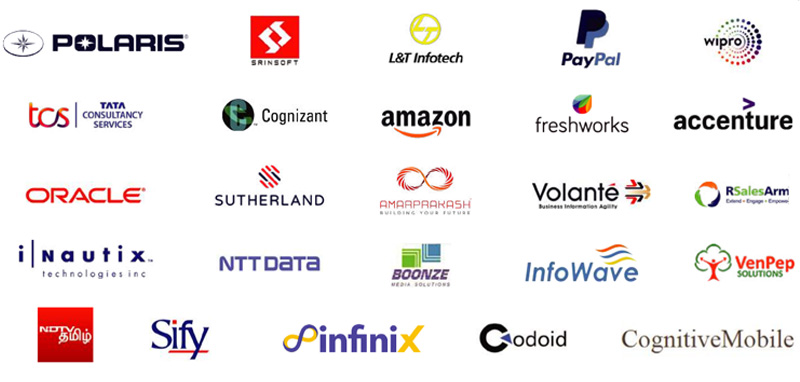
Frequently Asked Question (FAQ) about Data Science Course in Chennai
- Our Data Science Course is designed and taught by data science experts with years of experience as data analysts, data scientists, and data engineers.
- A blend of hands-on practical sessions with real-world examples is provided.
- Affordable fees, keeping students and IT working professionals in mind.
- Our course is convenient to undertake since it covers the normal working hours of a professional or student.
- Our final training, following the course, focuses on placement training.
- We provide interview tips for job interviews.
Yes, FITA Academy has tie-ups with more than 3,000 IT companies. Additionally, our highly active placement cell ensures 100% placement for our students. The cell also contributes by training students in mock interviews and providing Data Science Interview Questions and Answers, even after course completion.
Dial our support number 93450 45466, or visit any of our Data Science Course near me branches in Chennai as soon as possible.
You can enrol in any of our branches in Velachery, Anna Nagar, T Nagar, Tambaram, Pallikaranai, and Thoraipakkam OMR. In every FITA Academy branch in Chennai, the data science syllabus and learning methodology are uniformly standardized.
FITA Academy was founded in 2012 by IT specialists who aim to provide students with IT training at the lowest possible cost. With this in mind, more than 1,00,000 students from across the country have benefited from our programs.
At FITA Academy, we can offer personal attention to learners so they will be ready and capable of addressing any misconceptions that may arise in troubled or challenging situations. Thus, each data science batch is limited to 5 or 6 members.
Our data science faculty members are industry experts with extensive experience in the field, handling real-life data and completing large-scale, real-time projects in related areas such as big data, AI, data science, and data analytics across various industry-specific applications.
You can either contact or call us at FITA Academy to arrange for missed classes. However, we ensure that a missed Data Science Course in Chennai session is arranged within a reasonable timeframe for each student.
FITA Academy provides practical Python learning through real-world projects, offering hands-on experience. This method enhances your understanding of practical applications. This is why we are recognized as one of the top 10 Data Science institute in Chennai.
General Q & A about Data Science Course in Chennai
Which is the best place to learn data science in Chennai?
Is data science costly?
Is there a demand for data science jobs?
What is Data Science?
Why is data science important?
Does data science need coding?
Which language is used for data science?
- Python
- SQL
- R
- Julia
- JavaScript
- Scala
- Java
- Go
Can I learn data science in 3 months?
Is it possible to do Data Science if I am weak in Math?
Why and How is Data Science Considered a Difficult Course?
Want to be a Data Scientist?
To succeed as a data scientist, you should focus on the following:
- Programming languages like Python or R, among others, are courtesy of the well-established Department of Computer Science at the University of Warwick.
- Innovativeness and creativity added to its strategic knowledge in statistics and mathematics.
- Meta skills related to data manipulation and being able to extract insights from the data using SQL and Pandas.
- Awareness of machine learning and the possibility of using appropriate algorithms and techniques.
Is data science a high-paying career?
Is the Future of Data Science bright?
Does Google Have a Data Scientist Position?
What is the salary of a data scientist in Chennai?
How much can a fresher earn in data science?
What is the salary of a data scientist at TCS?
Do data scientists work from home?
What are all the skills required for a data scientist?
- Statistical Analysis and Mathematics
- Programming and Software Development
- Data Processing and Visualization
- Machine Learning & Artificial Intelligence (AI)
- Deep Learning
- Natural Language Processing (NLP)
- Big Data Technologies
- Cloud Computing
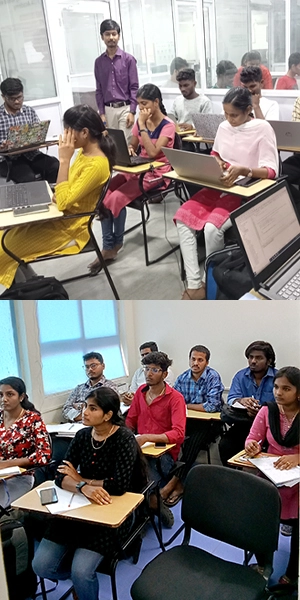
Related Blogs
- Best Data Science Tools
- Data Science vs Big Data
- Technical and Non Technical skills required to become a Data Scientist
- Top Programming Languages that every Data Scientist should Know
- What Future Scope of Data Science and Data Scientist
- Why Should Every Business Owner Learn Data Science?
- How To Start a Career In Data Science
- SQL For Data Science: For Beginners


